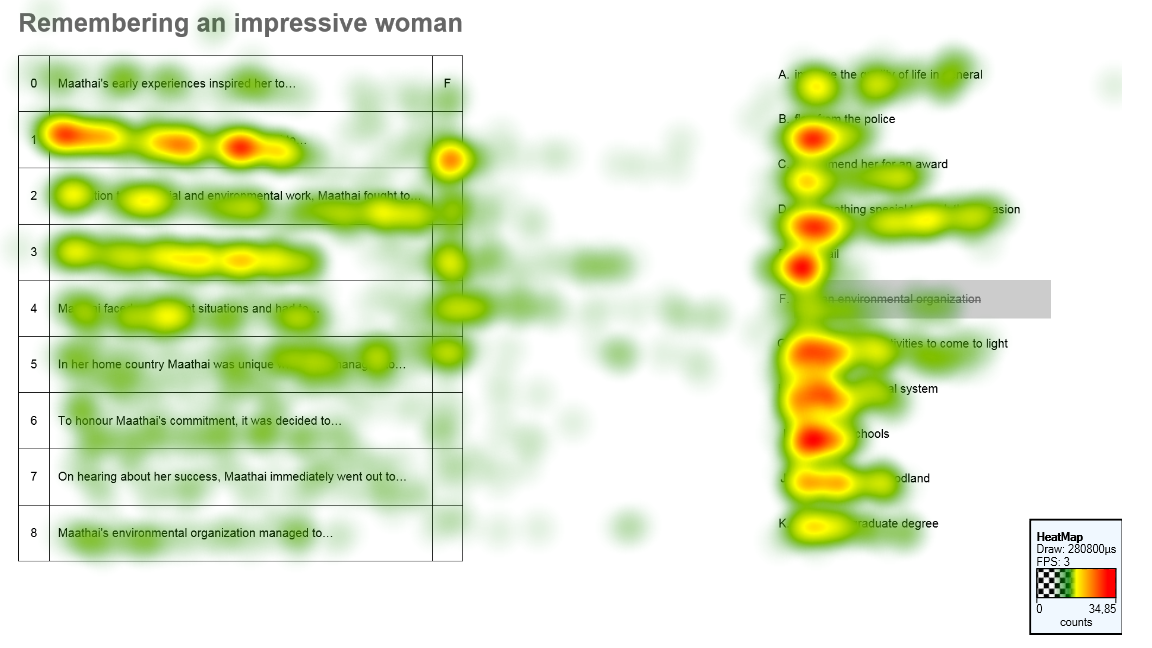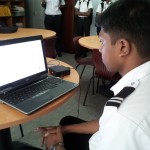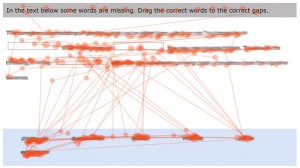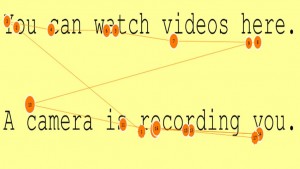A number of studies conducted by PhD students working in the areas of language testing, second language acquisition, and psycholinguistics make use of eye-tracking as part of the methodology. Click here for staff projects.
Completed student projects
Examinee interactions with video in foreign language listening comprehension tests
- Who? Aaron Olaf Batty (supervisor: Dr Luke Harding)
- What? This study investigates examinee interactions with video in foreign language listening comprehension tests, using the open-source, head-mounted Pupil eye tracking platform. After the examinee reads a comprehension question, she views a short video one time, then answers the question. Gaze position and interview data are being used to detect and describe patterns of interaction between gaze behavior and item content for the purpose of building a theoretical framework to inform and guide the development of future video-based tests of foreign language listening comprehension.
- Research output
- Batty, A. O. (2021). An eye-tracking study of attention to visual cues in L2 listening tests. Language Testing, 38(4), 511-535. https://doi.org/10.1177/0265532220951504
- Batty, A. O. (2017). The impact of visual cues on item response in video-mediated tests of foreign language listening comprehension. PhD thesis. Lancaster University, Lancaster.
- Batty, A. O. (2016, June). An eye-tracking study of task types and attention to nonverbal cues in video listening tests. Paper presented at the Language Testing Research Colloquium, Palermo (Italy).
- Batty, A. O. (2015). A comparison of video- and audio-mediated listening tests with many-facet Rasch modeling and differential distractor functioning. Language Testing, 32(1), 3-20. https://doi.org/10.1177/0265532214531254
The cognitive validity of repeating the input in listening assessment
- Who? Franz Holzknecht (supervisor: Prof Luke Harding)
- What? In this study eye-tracking is used in combination with other methods to look into cognitive processes of listening test-takers. In particular, it is investigated whether test-takers who are allowed to listen to a recording twice during a listening test use different cognitive processes than those who are allowed to listen only once.
- Research output
- Holzknecht, F. (2020). Double play in listening assessment. PhD thesis. Lancaster University, Lancaster. [Free access]
- Holzknecht, F. (2015, May). The cognitive validity of repeating the input in listening assessment. Paper presented at the EALTA conference, Copenhagen (Denmark).
Attentional processing of different types of written L2 input and its relationship with learners’ working memory capacity
- Who? Bimali Indrarathne (supervisor: Dr Judit Kormos)
- What? This study examined how second language learners paid attention to novel grammatical constructions in a reading text presented under different input conditions and how attention and the subsequent improvement in performance is related to participants’ working memory capacity.
- Research output
- Indrarathne, B. & Kormos, J. (2018). The role of working memory in processing L2 input: Insights from eye-tracking. Bilingualism: Language and Cognition, 21(2), 355-374.
- Indrarathne, B., Kormos, J., & Ratajczak, M. (2017, August). How much exposure is needed for learners to pay attention? Lessons from an eye-tracking study. Paper presented at the EUROSLA conference, Reading (UK).
- Indrarathne, B., & Kormos, J. (2017, March). Relationship between attentional processing of input and working memory: an eye-tracking study. Paper presented at the AAAL Conference, Portland, Oregon (USA).
- Indrarathne, B. & Kormos, J. (2017). Attentional processing of input in explicit and implicit learning conditions: an eye-tracking study. Studies in Second Language Acquisition, 39(3), 401-430.
- Indrarathne, B. (2016). Attentional processing of different types of written L2 input and its relationship with learners’ working memory capacity. PhD thesis. Lancaster University, Lancaster.
- Indrarathne, B., & Kormos, J. (2016, August). Relationship between attentional processing of input and working memory: an eye tracking study. Paper presented at the EUROSLA conference, Jyväskylä (Finland).
- Indrarathne, B., & Kormos, J. (2016, June). Relationship between attentional processing of input and working memory: an eye tracking study. Paper presented at the BAAL Language Learning and Teaching SIG Conference, Lancaster University (UK).
- Indrarathne, B., & Kormos, J. (2015, August). Attentional processing of input in different input conditions: an eye tracking study. Paper presented at the EUROSLA conference, Aix-en-Provence (France).
- Indrarathne, B., & Kormos, J. (2015, June). Attentional processing of input in different input conditions: an eye tracking study. Paper presented at the CRELLA/LU eye tracking research day, University of Bedfordshire (UK).
- Indrarathne, B., & Kormos, J. (2015, July). Attentional processing of input in different input conditions: an eye tracking study. Paper presented at the BAAL Language Learning and Teaching SIG Conference, University of Edinburgh (UK).
 The application of eye-tracking technology to investigate the cognitive processes underlying responses to banked gapfill items
The application of eye-tracking technology to investigate the cognitive processes underlying responses to banked gapfill items
- Who? Gareth McCray (supervisors: Dr Tineke Brunfaut & Dr Damon Berridge)
- What? This study investigated differences in cognitive processing across different test-takers whilst completing reading comprehension items. The study also specifically examined the usefulness of eye tracking to provide information on the construct being measured by banked gapfill items.
- Research output
- McCray, G., & Brunfaut, T. (2018). Investigating the construct measured by banked gap-fill items: Evidence from eye-tracking. Language Testing, 35(1), 51-73. [Free Access]
- McCray, G. (2013). Statistical modelling of cognitive processing in reading comprehension. PhD thesis. Lancaster University, Lancaster.
- McCray, G., Alderson J.C., & Brunfaut, T. (2012, June). Validity in reading comprehension items: triangulation of eye-tracking and stimulated recall data. Paper presented at the EALTA conference, Innsbruck (Austria).
Investigating word and sentence reading skills of English L1 and Arabic L1 readers of English
- Who? Joan Oakley (supervisors: Prof Judit Kormos & Dr Gareth McCray)
- What? This study used eye tracking to investigate differences in word and sentence reading skills between English-L1 and Arabic-L1 speakers when reading English texts. The results show that the Arabic-L1 participants display eye movement patterns which are different from, and potentially less effective than, the patterns executed by the English L1 participants. The study also examines how focused intervention results in changes in word level reading skills.
- Research output
- Oakley, M. J. (2018). Coming from different directions: A comparison of the eye movements of English L1 and Arabic L1 speakers reading in English and the implementation of an intensive reading intervention programme. PhD thesis. Lancaster University, Lancaster.
- Oakley, J. (2015, March).Contrasting eye movements: English and Arabic readers. Paper presented at TESOL Arabia, Dubai (United Arabic Emirates).
- Oakley, J. (2015, Jan.). English L1 and Arabic L1 speakers reading English sentences. Paper presented at Qatar University, Doha (Qatar).
- Oakley, J. (2014, Nov). Coming from different directions: An eye tracking study of English L1 and Arabic L1 speakers reading English sentences. Paper presented at the Qatar Foundation Annual Research Conference (ARC), Doha (Qatar).
Effectiveness of concept mapping and summarization techniques to enhance reading comprehension
- Who? Nour Toumi (supervisor: Prof Judit Kormos)
- What? This intervention study examines the effect of concept mapping and summarization techniques on learners’ metacognitive accuracy and comprehension monitoring when reading in English as a second language. It also explores the role of working memory capacity in comprehension monitoring. Eye movement patterns are analysed as part of the study’s pretest-posttest design, to gain insights into reading comprehension monitoring processes.
- Research output
- Toumi, N. E. (2020). The effects of concept mapping and summarisation on L2 readers’ comprehension monitoring and metacognitive accuracy. PhD thesis. Lancaster University, Lancaster.
Investigating test-takers’ cognitive processes while completing the TBEM-8 reading-to-write task.
- Who? Pucheng Wang (supervisor: Dr Luke Harding)
- What? This study investigates the cognitive processes which are tapped by the TBEM-8 (Test for Business English Majors, band 8) reading -to-write task. The study is conducted in two stages. In Stage 1, participants complete a task while their eye-movements are tracked. These eye traces then form the stimuli for a retrospective interview to elicit cognitive processes. In Stage 2, findings from Stage 1 are used to modify a Writing Process Questionnaire (Chan, 2013), which is then administered to approximately 100 business English majors in China.
- Research output
- Wang. P. (2018). Investigating test-takers’ cognitive processes while completing an integrated reading-to-write task: Evidence from eye-tracking, stimulated recall and questionnaire. PhD thesis. Lancaster University, Lancaster.
To learn about projects by staff involving eye-tracking, please click here.